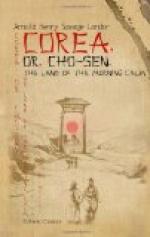I do not wish you to think, however, that all women are like that in Corea; for, indeed, they are not. In fact, the majority of them may be said to be good-mannered and even soft in nature, besides being painfully laborious. You should see the poor things on the coldest days and nights of winter, smashing the thick ice in the rivers and canals, and spending hour after hour with their fingers in the freezing water, washing the clothes of their lords and masters, who are probably peacefully and soundly asleep at home. You should see them with their short, wooden mallets, like small clubs, beating the dirt out of the wet cotton garments, soap being as yet an unknown luxury in the Corean household. The poorer women, who have no washing accommodation at home, have to repair to the streams, and, as the clothes have to be worn in the day, the work must be done at night. Sometimes, too, three or more join together and form washing parties, this, to a certain extent, relieving the monotony of the kneeling down on the cold stone, pounding the clothes until quite clean, and constantly having to break the ice that is continually reforming round their very wrists. The women who are somewhat better off do this at home, and if you were to take a walk through the streets of Seoul by night you soon get familiar with the quick tick, tick, tick, the time as regularly marked as that of a clock, heard from many houses, especially previous to some festivity or public procession, when everybody likes to turn out in his best. If a woman in our country were sent out to do the washing under similarly trying circumstances—and, mind, a suit of clothes takes no less than a couple of hours to wash properly—I have no doubt that she might be tempted to ask for a divorce from her husband for cruelty and ill-treatment; but the woman of Cho-sen thinks nothing of it, and as long as it pleases the man whom she must obey she does it willingly and without a word of complaint. In fact, I am almost of opinion that the Corean woman likes to be made a martyr, for, not unlike women of other more civilised countries, unless she suffers, she does not consider herself to be quite happy!
It sounds funny and incongruous, but it really is so. While studying the women of Corea, a former idea got deeply rooted in my head, that there is nothing which will make a woman happier than the opportunity of showing with what resignation she is able to bear the weight and drudgery of her duty. If to that she can add complaint of ill-treatment, then her happiness is unbounded. The woman of Cho-sen gets, to my mind, less enjoyment out of life than probably any other woman in Asia. This life includes misery, silence, and even separation from her children—the male ones—after a certain age. What things could make a woman more unhappy? Still, she seems to bear up well under it all, and even to enjoy all this sadness, I suppose one always enjoys what one is accustomed to do, otherwise I do not see how the phenomenon is to be explained.




